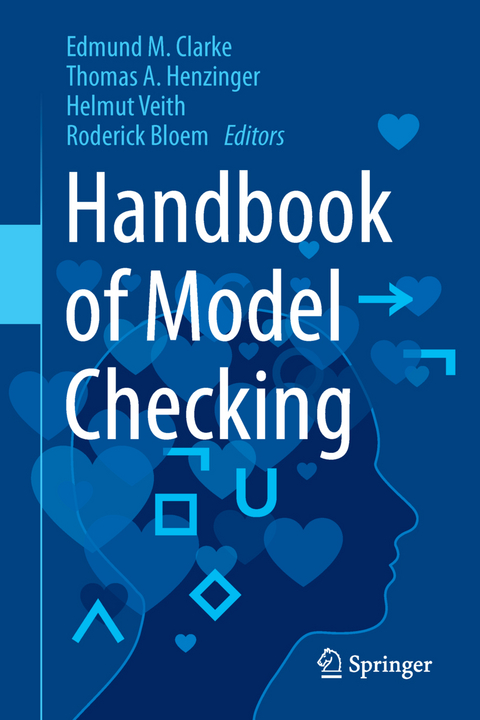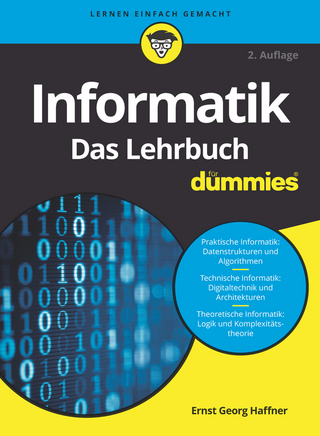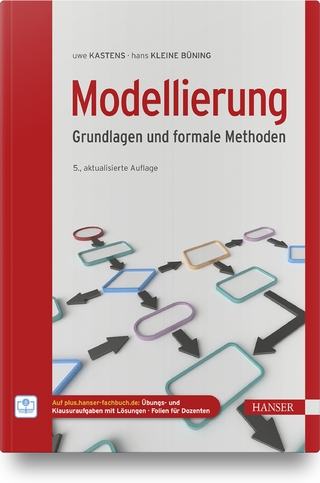
Handbook of Model Checking
Springer International Publishing (Verlag)
978-3-319-10574-1 (ISBN)
Model checking is a computer-assisted method for the analysis of dynamical systems that can be modeled by state-transition systems. Drawing from research traditions in mathematical logic, programming languages, hardware design, and theoretical computer science, model checking is now widely used for the verification of hardware and software in industry.
The editors and authors of this handbook are among the world's leading researchers in this domain, and the 32 contributed chapters present a thorough view of the origin, theory, and application of model checking. In particular, the editors classify the advances in this domain and the chapters of the handbook in terms of two recurrent themes that have driven much of the research agenda: the algorithmic challenge, that is, designing model-checking algorithms that scale to real-life problems; and the modeling challenge, that is, extending the formalism beyond Kripke structures and temporal logic.
The book will be valuable for researchers and graduate students engaged with the development of formal methods and verification tools.
Prof. Edmund M. Clarke is the FORE Systems Professor of Computer Science at Carnegie Mellon University. He received his Ph.D. degree in Computer Science from Cornell University in 1976. With E. Allen Emerson and Joseph Sifakis he received an ACM Turing Award in 2007 for his work on the development of model checking. He was a cofounder of the Computer Aided Verification (CAV) conference, and is a former Editor-in-Chief of the journal Formal Methods in Systems Design. His research interests include software and hardware verification and automatic theorem proving.Prof. Thomas A. Henzinger is the President of the Institute of Science and Technology Austria (IST Austria). He received his Ph.D. in Computer Science from Stanford University; the thesis was nominated for the ACM Best Dissertation Award in 1992. He won the Wittgenstein Award of the Austrian Science Fund (FWF) and he is a member of the Austrian Academy of Sciences, the German Academy of Sciences (Leopoldina), and the Academia Europaea. He is a Fellow of the ACM, IEEE and AAAS. He won a LICS Test-of-Time Award, he is an ISI Highly Cited Researcher, and he has won highest-impact, most influential, or best paper awards at events such as SIGSOFT, POPL, FSE and CONCUR. He won an ONR Young Investigator Award, an NSF Faculty Early Career Development Award, and he was a Fulbright Fellow. His research interests include mathematical logic, automata and game theory, and models of computation; analysis of reactive, stochastic, real-time, and hybrid systems; formal software and hardware verification, especially model checking; design and implementation of concurrent and embedded software; and executable modeling of biological systems.Prof. Dr. Helmut Veith was a professor in the Faculty of Informatics of Technische Universität Wien, and an adjunct professor at Carnegie Mellon University. He received his PhD (sub auspiciis praesidentis) in Computer Science from TU Wien. He previously held professor positions at TU München and TU Darmstadt. In his research, he applied formal and logical methods to problems in software technology and engineering, focusing on model checking, software verification and testing, embedded software, and computer security. Prof. Veith passed away in 2016 during the final editing on the Handbook.
Introduction to Model Checking.- Temporal Logic and Fair Discrete Systems.- Modeling for Verification.- Automata Theory and Model Checking.- Explicit-State Model Checking.- Partial-Order Reduction.- Binary Decision Diagrams.- BDD-Based Symbolic Model Checking.- Propositional SAT Solving.- SAT-Based Model Checking.- Satisfiability Modulo Theories.- Compositional Reasoning.- Abstraction and Abstraction Refinement.- Interpolation and Model Checking.- Predicate Abstraction for Program Verification.- Combining Model Checking and Data-Flow Analysis.- Model Checking Procedural Programs.- Model Checking Concurrent Programs.- Combining Model Checking and Testing.- Combining Model Checking and Deduction.- Model Checking Parameterized Systems.- Model Checking Security Protocols.- Transfer of Model Checking to Industrial Practice.- Functional Specification of Hardware via Temporal Logic.- Symbolic Trajectory Evaluation.- The mu-calculus and Model Checking.- Graph Games and Reactive Synthesis.-Model Checking Probabilistic Systems.- Model Checking Real-Time Systems.- Verification of Hybrid Systems.- Symbolic Model Checking in Non-Boolean Domains.- Process Algebra and Model Checking.
"The handbook's target audience is primarily researchers and graduate students who want to master the technical cores of model checking techniques. The text is encyclopedic in scope and provides an extensive treatment of the model checking domain." (Vitus S.W. Lam, Computing Reviews, May 20, 2019)
| Erscheint lt. Verlag | 8.6.2018 |
|---|---|
| Zusatzinfo | XLVIII, 1212 p. 220 illus., 6 illus. in color. |
| Verlagsort | Cham |
| Sprache | englisch |
| Maße | 155 x 235 mm |
| Themenwelt | Mathematik / Informatik ► Informatik ► Theorie / Studium |
| Schlagworte | Abstraction • Automata • Automata Theory • Binary Decision Diagrams (BDDs) • data-flow analysis • Dynamical Systems • hardware verification • Interpolation • Kripke Structures • Mathematical Logic • Model Checking • parameterized systems • Partial-Order Reduction • Program verification • reactive synthesis • Real-Time Systems • Satisfiability Modulo Theories (SMTs) • SAT solving • Software Testing • State-Transition Systems • temporal logic • verification |
| ISBN-10 | 3-319-10574-4 / 3319105744 |
| ISBN-13 | 978-3-319-10574-1 / 9783319105741 |
| Zustand | Neuware |
| Informationen gemäß Produktsicherheitsverordnung (GPSR) | |
| Haben Sie eine Frage zum Produkt? |
aus dem Bereich


